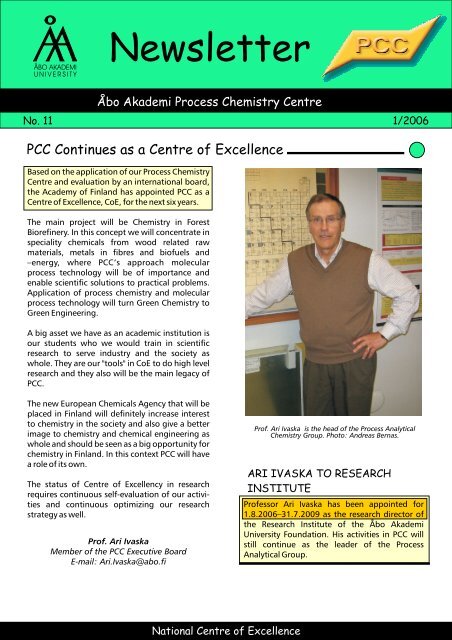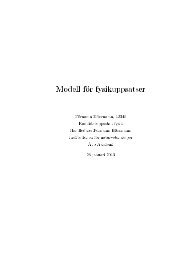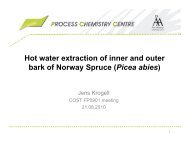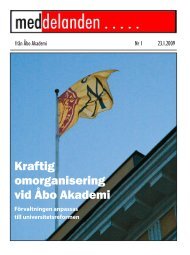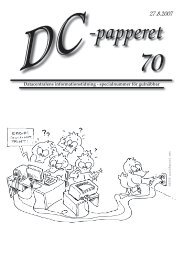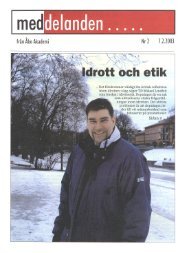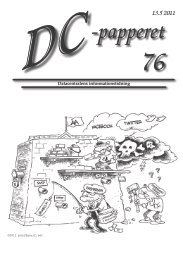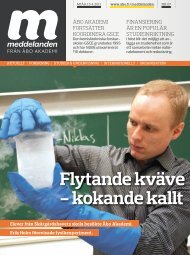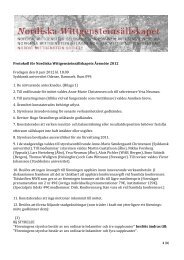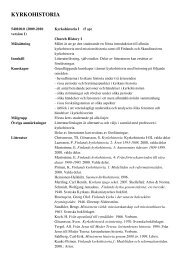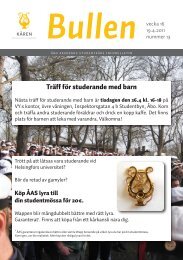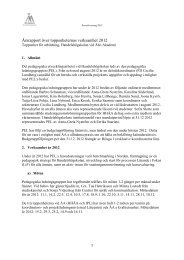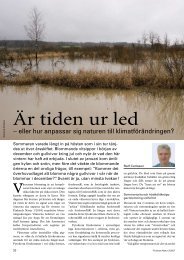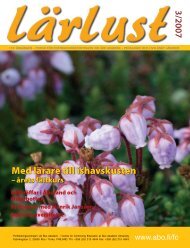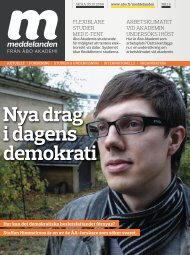Newsletter - Åbo Akademi
Newsletter - Åbo Akademi
Newsletter - Åbo Akademi
You also want an ePaper? Increase the reach of your titles
YUMPU automatically turns print PDFs into web optimized ePapers that Google loves.
<strong>Newsletter</strong><br />
<strong>Åbo</strong> <strong>Akademi</strong> Process Chemistry Centre<br />
No. 11 1/2006<br />
PCC Continues as a Centre of Excellence<br />
Based on the application of our Process Chemistry<br />
Centre and evaluation by an international board,<br />
the Academy of Finland has appointed PCC as a<br />
Centre of Excellence, CoE, for the next six years.<br />
The main project will be Chemistry in Forest<br />
Biorefinery. In this concept we will concentrate in<br />
speciality chemicals from wood related raw<br />
materials, metals in fibres and biofuels and<br />
–energy, where PCC’s approach molecular<br />
process technology will be of importance and<br />
enable scientific solutions to practical problems.<br />
Application of process chemistry and molecular<br />
process technology will turn Green Chemistry to<br />
Green Engineering.<br />
A big asset we have as an academic institution is<br />
our students who we would train in scientific<br />
research to serve industry and the society as<br />
whole. They are our "tools" in CoE to do high level<br />
research and they also will be the main legacy of<br />
PCC.<br />
The new European Chemicals Agency that will be<br />
placed in Finland will definitely increase interest<br />
to chemistry in the society and also give a better<br />
image to chemistry and chemical engineering as<br />
whole and should be seen as a big opportunity for<br />
chemistry in Finland. In this context PCC will have<br />
a role of its own.<br />
The status of Centre of Excellency in research<br />
requires continuous self-evaluation of our activities<br />
and continuous optimizing our research<br />
strategy as well.<br />
Prof. Ari Ivaska<br />
Member of the PCC Executive Board<br />
E-mail: Ari.Ivaska@abo.fi<br />
National Centre of Excellence<br />
Prof. Ari Ivaska is the head of the Process Analytical<br />
Chemistry Group. Photo: Andreas Bernas.<br />
ARI IVASKA TO RESEARCH<br />
INSTITUTE<br />
Professor Ari Ivaska has been appointed for<br />
1.8.2006–31.7.2009 as the research director of<br />
the Research Institute of the <strong>Åbo</strong> <strong>Akademi</strong><br />
University Foundation. His activities in PCC will<br />
still continue as the leader of the Process<br />
Analytical Group.
PCC News ...............................................................<br />
>>.............<br />
MIKKO HUPA PRESIDENT OF IFRF<br />
Process Chemistry Centre Professor Mikko Hupa has been appointed president of the<br />
organization International Flame Research Foundation, IFRF. IFRF, an International<br />
Centre of Excellence for combustion research, technology, and information, has<br />
approximately 1200 members in 23 countries including USA, Japan, and most of the<br />
western European nations (Germany, United Kingdom, France, Italy, the Netherlands,<br />
Finland, Sweden, etc.) IFRF is a co-operative research and technical service<br />
organization serving power generation and chemical industry, plus an industrial and<br />
academic network of organizations concerned with combustion and environment.<br />
The head office and communication center of IFRF is located adjacent to the industrial zone of Corus,<br />
Ijmuiden, the Netherlands. “ The task as president is challenging but exciting, especially now when the<br />
secretariat and the research laboratory will move from IJmuiden, where they have been acting for decades,<br />
to Pisa, Italy. IFRF has been one of the most important networks for our combustion engineering research<br />
here at the <strong>Åbo</strong> <strong>Akademi</strong> Process Chemistry Centre”,<br />
Prof. Hupa says.<br />
ANDRZEJ LEWENSTAM TO THE CHAIR OF IFCC<br />
Professor Andrzej Lewenstam was nominated and elected to the Chair of the International Federation of<br />
Clinical Chemistry (IFCC) Working Group on Selective Electrodes and Biosensors, starting 2006. The Group, a<br />
part of the Scientific Division of IFCC, is responsible for developing recommendations on the most frequent<br />
measurements in hospital laboratories and doctor offices, such as electrolytes, e.g. potassium and blood<br />
gases as well as light metabolites, e.g. glucose. The published recommendations are obligatory world-wide.<br />
BIORAFF GOT A FLYING START<br />
PCC has initiated a new project, where the ultimate goal is a more efficient use of forest resources. The aim is to<br />
use renewable materials in a more intelligent way than before, utilising in-depth knowledge in chemistry. This<br />
knowledge is generated through practical work in the research groups and is targeted to understand phenomena<br />
and chemical structures at the molecular level of the components found in trees. The chemistry in the Forest<br />
Biorefinery (BIORAFF) program is part of the activities of PCC, funded by Tekes. We will be able to characterise<br />
several useful products, propose new separation and modification technologies leading to increased production<br />
availability of existing production lines, and create added value in form of more valuable products. The program<br />
focuses on chemistry and the cumulating knowledge will be used in various biorefinery product and process<br />
development projects. The program will focus on three main areas:<br />
Specialty Chemicals and Materials. A key to the development of the Forest Biorefinery concept is to find new<br />
means of producing specialty chemicals and materials from forest resources. Preferable sources are waste streams<br />
of pulp and paper production. There are numerous opportunities for such production of natural specialty<br />
chemicals.<br />
Metals in Trees and Fibres. Management of the metal flows and balances is important in order to minimize<br />
the negative and maximize the positive effects that the different metal ions have on the processes and on the<br />
quality of the final products in today's pulp and paper mills, but also in the future in combined mills with<br />
additional chemical and energy production. Alkaline, earth alkaline, and transition metals are known to be<br />
important in the paper making process. Many transition metals are of significant environmental concern as well.<br />
Biofuels and -energy. The new biorefinery concepts all include conversion of parts of the feedstock biomass<br />
into energy via some novel processes based on pyrolysis, gasification, or combustion. To be able to use the many<br />
new waste derived fuels or fuel mixtures with no increased flue gas emission or plant availability (corrosion,<br />
fouling) problems is a major challenge and requires deep understanding of the properties of the fuels.<br />
Conventional fuel analysis is not sufficient to evaluate the practical feasibility of these fuels.<br />
We want the project to have as high an impact as possible on the competitiveness of our supporters. Therefore, it<br />
is vital that information of the scientific findings will find interested industrial partners for utilizing this in their<br />
own businesses. Therefore an industrial advisory board will be established starting from the beginning of 2007,<br />
the idea being that the members of the industrial advisory board get first hand information of the results of our<br />
projects. There will be a participation fee used for additional financing of our research activities. The membership<br />
is open for any interested partner and enquiries should be directed to Professor Markku Auer (mauer@abo.fi).<br />
National Centre of Excellence
.......................................................................<br />
>>.............<br />
3rd AND 4th PCC WORKSHOPS WERE HELD<br />
The 3rd PCC Workshop on the topic METALS FROM WOOD-BIOREFINERY ASPECTS was held on February 3,<br />
2006. Speakers were Mr. Kim Granholm (Process Analytical Chemistry) “ Removal of Metal Ions from Pulps by<br />
Chelation”, Mr. Andrey Pranovich (Wood and Paper Chemistry) “ Metals in Wood”,<br />
and Dr. Maria Zevenhoven<br />
(Combustion and Materials Chemistry) “ Metals from wood to ash“.<br />
Dr. Stefan Willför (Wood and Paper<br />
Chemistry) also highlighted the topic " Biorefinery - an Existing Proposal".<br />
The 4th PCC Workshop was held on<br />
April 25, 2006. Topics and presenters were Dr. Johan Wärnå (Kinetics & Catalysis) “ Kinetics and Reactor<br />
Modeling”, Dr. Christian Mueller (Combustion and Materials Chemistry) “ Computational Fluid Dynamics”,<br />
Dr. Ville Nieminen (Kinetics & Catalysis) “ Molecular Modeling/Computational Chemistry”,<br />
Dr. Tomasz<br />
Sokalski (Process Analytical Chemistry) “ Does Analytical Chemistry Need Mathematical Modeling”,<br />
and Ms.<br />
Eija Bergelin (Wood and Paper Chemistry) “ Extractive Flows“.<br />
MISCHA ENJOYS TRAVELS BETWEEN TURKU AND TORONTO<br />
Diplom-Ingenieur in Chemical Engineering Mischa Theis from<br />
Cologne, Germany, has studied the interaction of fly ashes with<br />
different fouling tendencies during biomass combustion at the<br />
Combustion and Materials Chemistry group within the Process<br />
Chemistry Cetre. The date of his doctor dissertation is June 2, 2006<br />
with the kustos Prof. Mikko Hupa, PCC, and the opponent Prof.<br />
Hartmut Spliethoff from Technical University of Munich, Germany.<br />
Mischa graduated at University of Dortmund in Germany and<br />
continued his hobby of travelling during his years as a researcher -<br />
cumulatively 18 months of experiments at the Pulp and Paper<br />
Centre, University of Toronto, Canada as well as course work in<br />
Denmark, Estonia, Germany, Sweden, and USA.<br />
The objective of the research was to study the interaction of fly ashes with different fouling tendencies<br />
during biomass combustion and to provide consistent data for development and validation of deposition<br />
models based on computational fluid dynamics (CFD). Oat straw and eucalyptus bark were used to represent<br />
biomass fuels that containing large amounts of alkali metals, alkaline earth metals, chlorides, and sulfates in<br />
the ash and produce fly ashes with a high fouling tendency. Peat was used as an example fuel that contains<br />
large amounts of silica and alumina in the ash and produces fly ash with a low fouling tendency. The results<br />
showed that the deposition rate was highest for straw, intermediate for bark, and lowest for peat. This trend<br />
was correlated to decreasing alkali contents from straw ash to bark ash to peat ash. The composition of the<br />
deposits resembled the composition of the fuel ash when firing the fuels individually. However, when straw<br />
and bark were fired in mixtures with peat, they behaved differently. While the presence of approximately 30<br />
wt% of ash from peat was sufficient to decrease the ash deposition rate of straw-peat mixtures to the same<br />
value as that of peat fired alone, it was necessary to mix approximately 70 wt% of peat ash with bark ash to<br />
obtain the same effect. Chemical analyses of the deposits suggested that erosion caused by silicate ash<br />
particles from the peat was the main mechanism for lowering the ash deposition rate of straw-peat mixtures.<br />
For bark-peat mixtures, sulfation reactions appeared to play an important role in minimizing deposit<br />
buildup. K2SO4 was found in the deposits when the deposition rate was low, while KCl was found when the<br />
deposition rate was high. The low deposition rate obtained from firing bark depleted of alkali confirmed the<br />
important roles of potassium, sulfur, and chlorine in deposit buildup.<br />
Finland has a pretty pristine nature, so for instance I liked running in the quiet forests into the sunrises before<br />
coming to work, biking in the evenings or swimming across to Hirvensalo from Uittamo beach in the<br />
summer. And of course I liked sauna and ice hole swimming on Ruissalo Island. On the other hand, Finland<br />
may occasionally get a bit small if one is used to crowds and people. So I had the most perfect arrangement<br />
with staying a couple of months here and then a couple of months across the miles in Toronto to enjoy the<br />
amenities of a five-million city, Mischa says.<br />
National Centre of Excellence
NEW BOOK BY MURZIN AND SALMI<br />
PCC Facts and Mission<br />
>>.............<br />
PCC <strong>Newsletter</strong><br />
A new engineering textbook with the title “ Catalytic Kinetics”<br />
by authors Prof. Dmitry Yu. Murzin and Prof.<br />
Tapio Salmi at the Kinetics & Catalysis group has been published by Elsevier (ISBN: 0-444-51605-0, 492<br />
pages, publication year: 2005). The goal group is Chemical Engineers, Physical Chemists, and Organic<br />
Chemists. This book unifies the main sub disciplines forming the cornerstone of catalytic kinetics.<br />
EUROPACAT VIII 2007 - www.europacat.org<br />
The Nordic Catalysis Society takes pleasure in inviting the catalysis community<br />
to Finland for the EUROPACAT VIII congress 2007, a co-operative effort<br />
between Denmark, Finland, Norway, and Sweden. The Nordic Catalysis Society<br />
has participated in the planning of the scientific programme of the<br />
conference. The second announcement and call for papers is now available.<br />
The abstract submission deadline is Jan 31, 2007. There will be 5 plenary<br />
lectures, 18 keynote lectures, 180 oral presentations, equipment and book<br />
exhibitions as well as poster sessions (3x250). The Berzelius Lecture is given by<br />
the 2005 Nobel Prize winner in Chemistry, Prof. R.H. Grubbs from California<br />
Institute of Technology. The plenary lectures are held by Prof. James A.<br />
Dumesic (University of Wisconsin-Madison), Prof. Irina I. Ivanova (Moscow<br />
State University), Dr. Herman Kuipers (Shell Global Solutions), Prof. Jens K.<br />
Nørskov (Technical University of Denmark), and Prof. Ferdi Schüth (Max-<br />
Planck-Institut für Kohlenforschung). The keynote speakers will be listed on<br />
the congress website.<br />
PCC Scientific and Industrial Advisory Boards<br />
SAB Douglas Reeve, University of Toronto<br />
Jiri Janata,<br />
Georgia Institute of Science and Technology<br />
Jean-Claude Charpentier,<br />
CNRS, Lyon<br />
IAB Karl Ahlblad,<br />
AGA Kari Knuutila, Outokumpu Aarni Tenhosaari,<br />
Turku Polytechnic<br />
Håkan Gros, Danisco Timo M. Koskinen, UPM-Kymmene Kari Toivonen,<br />
Turku Science Park<br />
Lars Gädda, M-real Lars Peter Lindfors, Perstorp Harri Turpeinen,<br />
Fortum Oil and Gas<br />
Markku Karlsson, UPM-Kymmene Kenneth Sundberg, Ciba Specialty Chemicals Hannu Vornamo,<br />
Kemianteollisuus r.y.<br />
Timo Kenakkala, Kemira Ismo Reilama, Metsä-Botnia Jan Öst,<br />
Thermo Electron<br />
The <strong>Åbo</strong> <strong>Akademi</strong> Process Chemistry Centre (ÅA-PCC) studies physico-chemical processes at the molecular level in<br />
environments of industrial importance, in order to meet the needs of tomorrow’s process and product development.<br />
Our particular focus on the understanding of complex process chemistry we call<br />
Molecular Process Technology<br />
The Centre consists of four research groups at the Department of Chemical Engineering, Faculty of Technology, <strong>Åbo</strong><br />
<strong>Akademi</strong> University: Combustion & Materials Chemistry (Prof. Mikko Hupa), Kinetics & Catalysis (Prof. Tapio Salmi),<br />
Process Analytical Chemistry (Prof. Ari Ivaska) and Wood and Paper Chemistry (Prof. Bjarne Holmbom). In the year 2005,<br />
about 130 persons (including about 20 senior researchers) took part in the PCC activities with a total funding of<br />
approximately 6 Million € .<br />
Editor-in-Chief ••• Prof. Mikko Hupa, e-mail: Mikko.Hupa@abo.fi Editor ••• Dr. Andreas Bernas, e-mail: Andreas. Bernas@abo.fi<br />
PCC Executive Board<br />
Prof. Bjarne Holmbom,<br />
e-mail: Bjarne.Holmbom@abo.fi<br />
Prof. Mikko Hupa,<br />
e-mail: Mikko.Hupa@abo.fi<br />
Prof. Ari Ivaska,<br />
e-mail: Ari.Ivaska@abo.fi<br />
Prof. Tapio Salmi,<br />
e-mail: Tapio.Salmi@abo.fi<br />
Coordinating assistant: Maria Ljung, e-mail: pcc@abo.fi<br />
Biskopsgatan 8, 20500 <strong>Åbo</strong>/Turku, Finland<br />
For more information and recent publications: www.abo.fi/instut/pcc


